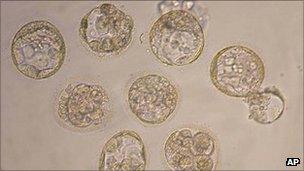South Korea to renew stem cell research after scandal
- Published

Image of eight cloned embryos from Seoul National University in 2004 that were later proved to be fake
South Korea's president has promised $89m (Ā£56m) in state funds to revive the country's reputation as a world leader in stem cell research.
In his regular radio address, Lee Myung-bak described the field as a "new growth engine" for the economy.
The announcement comes five years after a damaging scandal, when it was found a cloning pioneer had faked research.
Analysts say Mr Lee's pledge belies concerns that South Korea could fall far behind fast-moving rival nations.
The president said South Korea alongside the US had been a world leader in stem cell research a decade ago.
"Unfortunately, there was a disappointing incident which caused inevitable damage to the entire stem cell research community in Korea," he said, referring to the conviction of Hwang Woo-suk.
Hwang's claims he had succeeded in creating human embryonic stem cells by cloning raised hopes of finding cures for diseases such as Alzheimer's, until revelations that his work was bogus.
The controversy caused shockwaves in South Korea, where the scientist had been widely regarded as a national hero.
As Seoul's stem cell programme faltered, other nations streamlined regulations and aggressively expanded funding for research, Mr Lee said.
"We must restore our national fame as a stem cell powerhouse," he said, adding the government would ease regulations and establish a state stem cell bank.
Scientists believe stem cells could be used as a super "repair kit" for the body, generating healthy tissue to replace that damaged by trauma or compromised by disease.
Among the conditions which scientists believe may eventually be treated by stem cell therapy are Parkinson's disease, heart disease, stroke, arthritis, diabetes, burns and spinal cord damage.
- Published25 November 2014